Your Client Lead Generation Problem Solved.
Our process takes one-off services like PPC, SEO, Web Design, Content Marketing, CRO and others and combines them to create one simple, seamless path to growth and profitability for your family law practice. It provides you with a clear strategy and results, not confusion and wasted marketing dollars.
Get Found. Build Trust. Grow Your Legal Practice.

We help family law firms increase their revenue and grow their legal practices through digital marketing strategies and services proven to work.
Guide to Family Law Digital Marketing:
A Comprehensive Strategy to Grow Your Law Firm or Legal Practice
Digital marketing can be an extremely effective way for family attorneys and law firms to attract more of their ideal clients on autopilot, freeing them from the concern of where their next client will come from.
It can empower them to be more selective with the clients they choose to work with and to start charging more for their services.
If you’re a family law attorney who has tried digital marketing and you’re frustrated with your lack of results, or you want to start marketing your family law firm online, but you’re confused and maybe even overwhelmed and just don’t know where to start, then this guide is for you.
The #1 mistake I see attorneys making when marketing their legal practice online is that they don’t have a cohesive plan or strategy.
Developing a Complete Digital Marketing Strategy for Your Family Law Practice
In this guide, I cover our “4 pillar” process to family law digital marketing. It is broken down into 9 simple and actionable steps, that when done correctly, has proven extremely effective in getting family law firms more of their best clients.
Developing a digital marketing strategy that captures the essence of your practice while effectively reaching out to your audience is a balancing act of creativity and analysis. It comprises several components, each serving a specific function in the grander scheme of client engagement and conversion.
It’s time to move beyond trends, buzzwords, and one-off ideas and instead anchor your efforts in a proven, successful strategy that will work in the long run.
Let’s explore the “4 pillars” of a solid family law digital marketing strategy, as a framework to structure our efforts.

Our “4 Pillar” System for Family Law Digital Marketing

Pillar 1
Branding & Content Strategy

Pillar 2
Your Website

Pillar 3
Visitors and Website Traffic
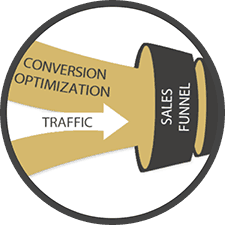
Pillar 4
Conversion Rate Optimization (CRO)
Our 4 Pillar System Broken Down into 9 Actionable Steps:
1. Understanding The Nuances of Marketing in Family Law
Family law marketing is inherently different. Unlike marketing for consumer goods or corporate services, family law services are deeply personal and emotionally nuanced.
Individuals seeking family law services are often navigating some of the most challenging periods of their lives. Therefore, the marketing approach must be highly customized, not only to reach but also to resonate with your prospective clients during this period in their life.
In the practice of family law, digital marketing must do more than simply inform — it must connect and empathize. As potential clients seek legal counsel during life-altering events, a firm’s online presence must be professional but also profoundly approachable.
Incorporating custom content such as empathetic blog posts that address specific pain points and videos that showcase the firm’s compassionate approach can bridge the gap between legal expertise and emotional understanding. This is critical in building trust and establishing a meaningful connection with prospective clients.
2. Identifying Your Target Audience
Identifying the target audience in family law marketing goes beyond demographics; it’s about understanding the emotional journey of your prospective clients. Strategies must be tailored to meet them at their point of need, again with sensitivity and empathy.
By humanizing the firm through client testimonials, which serve as stories of hope and resolution, attorneys can demonstrate a commitment to their clients’ well-being. Custom content marketing becomes an avenue to not just attract clients, but to show a deep investment in their success, making the firm relatable and its services more appealing to those facing personal legal challenges.
3. Building an Effective Family Law Website for Your Legal Practice
For family law attorneys, your firm’s website should serve as the cornerstone of all digital marketing efforts, as it often provides the first impression to potential clients. An effective website must not only rank well on search engines but also excel at converting prospects into clients. Here’s how family attorneys can create a website that achieves both.
Key Elements of Law Firm Web Design for Family Attorneys
- Modern, Professional, and Simple Design: Your website should communicate professionalism with a clean, user-friendly design. It should reflect your firm’s personality while being optimized for mobile devices. Avoid over-complicated features that can detract from the user experience. Simplicity in design aids in navigation and reinforces the message you want to send to your clients.
- Client-Centric Content: Every element of your website, from the structure to the content, should speak to your ideal clients. It should quickly and clearly convey the value of your legal services. Incorporating FAQs and addressing common client concerns can demonstrate that your firm is knowledgeable and prepared to assist with potential client’s specific legal needs.
- Build Trust through Branding: A consistent and professional brand appearance boosts credibility. Incorporate testimonials, case studies, and client stories to provide social proof of your expertise and success in family law. Use colors and design elements that convey the right emotional tone for your practice area—softer colors and imagery can be effective for family law, where sensitivity and trust are paramount. Personalize your website with photos of your team and offices while avoiding generic stock images. This personal touch can make your firm feel more approachable and trustworthy.
- Encourage Action: Your website should guide visitors towards taking action, whether that’s making a call, filling out a contact form, or scheduling a consultation. Ensure calls to action are prominent, creating a sense of urgency and making it effortless for clients to reach out.
- Mobile Optimization: With the ever increasing use of mobile devices to search for legal services, a mobile-responsive design with features like ‘click-to-call’ buttons and easy to use contact forms are critical elements for a family law website to convert prospects into paying clients.

A successful family law firm website should be more than a digital brochure; it should be a client conversion engine. By following these principles, family law attorneys can create a website that not only draws in the right audience but also engages them effectively, increasing the likelihood that they will reach out for legal assistance, thereby increasing a firm’s marketing ROI.
4. Search Engine Optimization (SEO) for Family Law Firms
In the competitive practice area of family law, standing out in search engine results is not just beneficial—it’s essential for survival and growth. SEO for Family Law involves creating a strategy and fine-tuning your online presence so that your website and law firm’s brand show up higher in search engines like Google and Bing. Here, we break down SEO for family law attorneys into five actionable elements, each equally important for family law firms seeking to grow their legal practice with digital marketing.
SEO: The ROI and Growth Machine for Your Family Law Practice’s Online Visibility
SEO isn’t merely about improving your website’s visibility; it’s about positioning your firm to be found at the exact moment potential clients are in need of you legal services. With a staggering 64% of legal service seekers starting their journey online, a robust SEO strategy can serve as your firm’s beacon, guiding those in need of your expertise directly to your virtual door.

Five Keys to a Successful Family Law SEO Campaign
 Content is King: Content reigns supreme in the realm of SEO. For family law attorneys, this means developing content that empathizes, educates, and engages. Your law firm’s content should be a mix of practice area expertise, compassionate guidance for common family law issues, and resources that offer genuine value. Remember, Google prioritizes content that serves the searcher’s intent, so always focus on quality that addresses specific queries related to family law instead of generic topics and high quantity. One high value, keyword targeted, researched and well written blog post per month is far better than posting a generic short piece once a week.
Content is King: Content reigns supreme in the realm of SEO. For family law attorneys, this means developing content that empathizes, educates, and engages. Your law firm’s content should be a mix of practice area expertise, compassionate guidance for common family law issues, and resources that offer genuine value. Remember, Google prioritizes content that serves the searcher’s intent, so always focus on quality that addresses specific queries related to family law instead of generic topics and high quantity. One high value, keyword targeted, researched and well written blog post per month is far better than posting a generic short piece once a week.- On-Page SEO: This involves optimizing your website’s pages through meta descriptions, title tags, image alt tags, H1 tags, and internal linking. Each of these elements helps search engines understand the context and content of your pages, improving your visibility for targeted queries. For instance, a meta description that includes “Experienced Family Law Attorney in [Your City]” can improve click-through rates from search results.
- Backlinks: Think of backlinks as votes of confidence from other reputable sites. The more authoritative websites that link to your content, the more search engines perceive your site as a credible source of information. Cultivating quality backlinks can elevate your firm’s online authority and subsequently, its search engine rankings.
- Local SEO: Most family law issues are dealt with locally, making local SEO vital. Optimize your Google Business Profile (once called Google My Business) and ensure your firm appears in legal directories. This increases the likelihood of appearing in the coveted local “3-pack” on Google, directly translating to higher visibility and increased client inquiries.
- Analyze and Adapt: The final piece of the SEO puzzle is analysis. Track your website’s performance using tools like Google Analytics and Google Search Console to understand how users find and interact with your site. Adjust your strategies based on this data to continually refine and improve your SEO efforts.
A Strategic Approach to Content
When crafting content, integrate keyword research to ensure relevance and searchability. Cover topics that genuinely matter to your audience, such as “child custody laws in [State]” or “how to file for divorce in [Your City].” The aim is to make your firm’s website a hub of family law knowledge that search engines deem worthy of top rankings.
Conversions (i.e. new clients): The True Measure of SEO Success
While metrics like traffic and keyword rankings are important, the ultimate barometer of your SEO success is client acquisition. Your SEO investment should translate into a consistent stream of new clients, that is the true measure of how effective your online marketing efforts really are.
In the dynamic field of family law, where every case is as unique as the individuals involved, your digital marketing strategy (particularly SEO) should be equally nuanced and client-centric. By implementing the techniques outlined above, you position your firm not just as a provider of family legal services, but as a guiding light for those navigating the complexities of family law. Google will reward you for your efforts.
5. Pay-Per-Click (PPC) Advertising Strategies
PPC advertising is a fantastic tool that provides the ability to appear directly in front of potential clients who are actively seeking your legal services. With the correct implementation, family law firms can use PPC to quickly transform clicks into consultations and, ultimately, clients.
Efficient PPC Campaigns: Getting New Clients Quickly for Family Law Firms
PPC allows you to buy visits to your website through platforms like Google Ads, with the cost justified by the value of the business it brings. A meticulously managed PPC strategy is crucial, as legal industry keywords are often some of the most expensive. But, with the right approach you can yield a significant return on investment by getting found at the moment a prospective client is looking for divorce, child custody, mediation, or any other family law legal services. The key is ensuring your conversion rates and cost per lead are aligned with your firm’s goals for growth while keeping an eye on your ad spend and conversion rates.

Keyword Strategy: A Critical Element of Success in PPC Advertising
The success of a PPC campaign hinges on keyword selection. Opting for the right keywords ensures that your ads are displayed to those seeking the exact services you offer. Employing keyword matching options, from broad to exact match, allows you to control how targeted your audience is, while negative keywords help filter out irrelevant traffic, optimizing your campaign’s performance and spend.
Google Local Service Ads (LSA): A New Tool for Family Law Attorneys
Google Local Services Ads (LSAs) offer a unique advantage for family law attorneys, positioning ads above traditional PPC and charging only for leads rather than clicks. The “Google Screened” badge associated with LSAs also adds a layer of trust for potential clients.
Google Local Service Ads for attorneys can instantly increase your online visibility by placing you at the top of Google search results (even above the standard pay-per-click ads). This makes it possible for you to be listed on page 1 of Google up to 4 times now. The LSA position, standard PPC position, Google Maps (sometimes called the “3 pack”), and the regular organic search results.

Crafting a PPC Campaign for Your Family Law Practice
Here are the fundamental steps to craft an effective PPC campaign for your family law firm:
- Goal Definition: Clearly define what you aim to achieve, whether it’s raising your firm’s brand awareness or driving client consultations.
- Audience Understanding: Understand who your target audience is to create ads that resonate with them and promote action.
- Ad Development: Your ads should be succinct, clear, and include a compelling call-to-action, positioning your firm as the solution to your potential client’s legal needs. Also, Google rolls out new campaign options from time to time and these can be extremely powerful if you take advantage. One example is Google’s recent “Performance Max” campaigns. These give you the ability to use video ads and reach potential clients across more of Google’s platforms (like YouTube) in a streamlined and simple way.
- Landing Page Optimization: Ensure that the landing pages are highly relevant to the ad content, easy to navigate, and designed to convert. For example, don’t send someone who does a search for “divorce lawyer near me” to a general page about your family law services. You need your landing pages to be much more specific than that, or else your conversion rates will go down. If someone searches “divorce lawyer near me” you should be sending them to a page specifically about your divorce legal services. That page should also talk about your experience in divorce law and any successes along with client testimonials to back that up.
Measuring Success
Monitoring PPC metrics is essential to gauge the effectiveness of your campaign. Important metrics include click-through rates, cost-per-click, quality score, and most importantly, conversion rates. These indicators will help you understand the efficiency of your ads and inform necessary adjustments to maximize ROI.
The future of Family Law PPC is bright, with ongoing advancements in AI and machine learning promising more sophisticated campaign management. Trends like automation and personalization will continue to refine PPC strategies, enabling family law firms to target potential clients even more effectively. Staying on top of these new features and tools will be critical for those looking to gain or maintain a competitive advantage over their competitors.
6. Social Media Marketing for Family Lawyers
Social media platforms are where conversations happen. For family lawyers, these platforms offer a unique opportunity to establish thought leadership and engage with their community. Sharing insights into family law and posting informative articles on platforms like Facebook, LinkedIn, and Twitter (now X) can help further build and grow your brand.




Something to keep in mind though is that social media marketing is about starting and joining conversations, not just broadcasting your services. To successfully market your family law firm on social media, you’ll need to engage with your followers, answer their questions, and build their trust. It’s a more time-consuming marketing endeavor that typically pays off over the long run as opposed to getting new clients quickly.
7. Content Marketing and Blogging for Family Law Firms
Content marketing is not just about filling your website with words and videos; it’s about crafting a message that resonates with the individuals and families who need your legal expertise the most. Here’s how family law and divorce lawyers can create content that ranks well on search engines and brings in new clients.
Crafting a Client-Centered Content Strategy
To truly engage and convert, your content must speak directly to your ideal clients. This means understanding their challenges and offering real solutions. Create blog posts, infographics, and videos that address specific family law concerns, like “How to Protect Your Assets During Divorce” or “What to Know About Child Custody in [Your State].”

The Importance of High-Quality Content
In the world of legal services, particularly family law, providing valuable, accurate, and empathetic content is one of the big things that can set you apart from your competitors. It positions you as not just an attorney but as an advocate and guide through their most challenging times.
High-quality content is the cornerstone of increasing organic traffic, establishing authority, building trust, and most critically, signing more clients.
Leveraging SEO through Content
For your content to reach the people who need it, it has to be discoverable. This makes optimizing for search engines a must. Use keyword research tools to understand what terms your potential clients are using and tailor your content accordingly. Remember, Google rewards content that aligns with users’ search intent, so focus on creating content that answers their most pressing family law questions.
Enhancing Brand Awareness and Conversions with Sales Copy
Your content should be an extension of your brand. It should communicate your firm’s unique approach to handling family law cases. Are you collaborative and empathetic? Are you aggressive and results-oriented? Use your content and sales copy to reflect these brand qualities. Furthermore, well-crafted content and sales copy improves brand sentiment and helps convert readers into clients by showcasing your expertise and approachability.

Actionable Steps For Great Family Law Content Creation
- Define Your Audience: Who are your ideal clients? What are their fears, concerns, and questions? Tailor your content to address these points directly.
- Keyword Research: Use keyword research tools such as Moz Keyword Explorer and Ahrefs Keyword Explorer to find the terms your clients are searching for. Craft your content around these terms to ensure visibility.
- Content Types: Develop comprehensive service area pages that detail your specific services (such as divorce, child custody, mediation, etc.). For optimal SEO results, consider breaking those down even further into location-specific pages if you serve multiple communities or geographic areas.
- Blog Posts: Regularly update your blog with detailed posts about specific aspects of family law. For instance, discuss the nuances of divorce law in your jurisdiction or give advice on co-parenting after separation.
- Formatting for Readability: Make sure your content is scannable and accessible. Use headlines, bullet points, and images to break up text and draw the reader’s eye to important information.
Conversion Rate Optimization
The ultimate measure of your content’s success is its ability to convert visitors into clients. Your website should not only attract visitors with engaging content but also guide them towards contacting your firm. Ensure each piece of content, page, or blog post has a clear call-to-action, whether it’s to read another article, sign up for a newsletter, or schedule a consultation.
Maintaining Your Blog
A blog is a powerful tool to enhance your firm’s SEO and demonstrate your knowledge, experience, and expertise. It’s also a great platform to answer specific questions potential clients might have.
Google knows that when somebody is searching for a family law attorney, they are looking for two things, a specialist with experience. In fact, 58% of people in a recent survey we conducted said that the most important factor to them when deciding on an attorney to hire is for the attorney to “specialize” in the area of law they are seeking help with.
By maintaining a blog that covers family law in your geographic area you are signaling to both Google and your prospective clients that you are an experienced specialist without ever having to say so. Regular blogging shows that your firm is active and engaged with current family law issues, which can build even more trust with potential clients.

In summary, your content should help your potential clients answer questions while feeling understood and supported. By creating client-centered, SEO-driven content, you can build a strong online presence that not only ranks well in search engines, but also helps convert prospects into paying clients. It’s not just about being seen—it’s about being seen as a trusted family law expert.
8. Online Reviews and Reputation Management for Family Lawyers
Online reviews are not just a reflection of your service quality; they are a pivotal aspect of your digital presence that directly impacts your firm’s brand and client acquisition potential.
Our survey results indicated that 80% of potential clients consider online reviews before hiring an attorney. Even if a person found an attorney through a referral from a friend or family member, they would still check that attorney’s online reviews.
Online reviews have become essential to any law firm’s brand and marketing efforts. Positive online reviews are worth their weight in gold and should be a top priority in marketing your law firm.
Here’s how family lawyers can manage their online reputation effectively:
Enhancing Search Rankings through Reviews
Google’s algorithm favors businesses with a steady stream of reviews across various platforms like Google, Yelp, and Facebook. Not only do these reviews improve your local search engine rankings, but they also enhance visibility in Google Maps listings, crucial for clients searching for family law services in their area.
Optimizing your Google Business Profile and requesting reviews to it is one of the biggest quick digital marketing wins you can get.
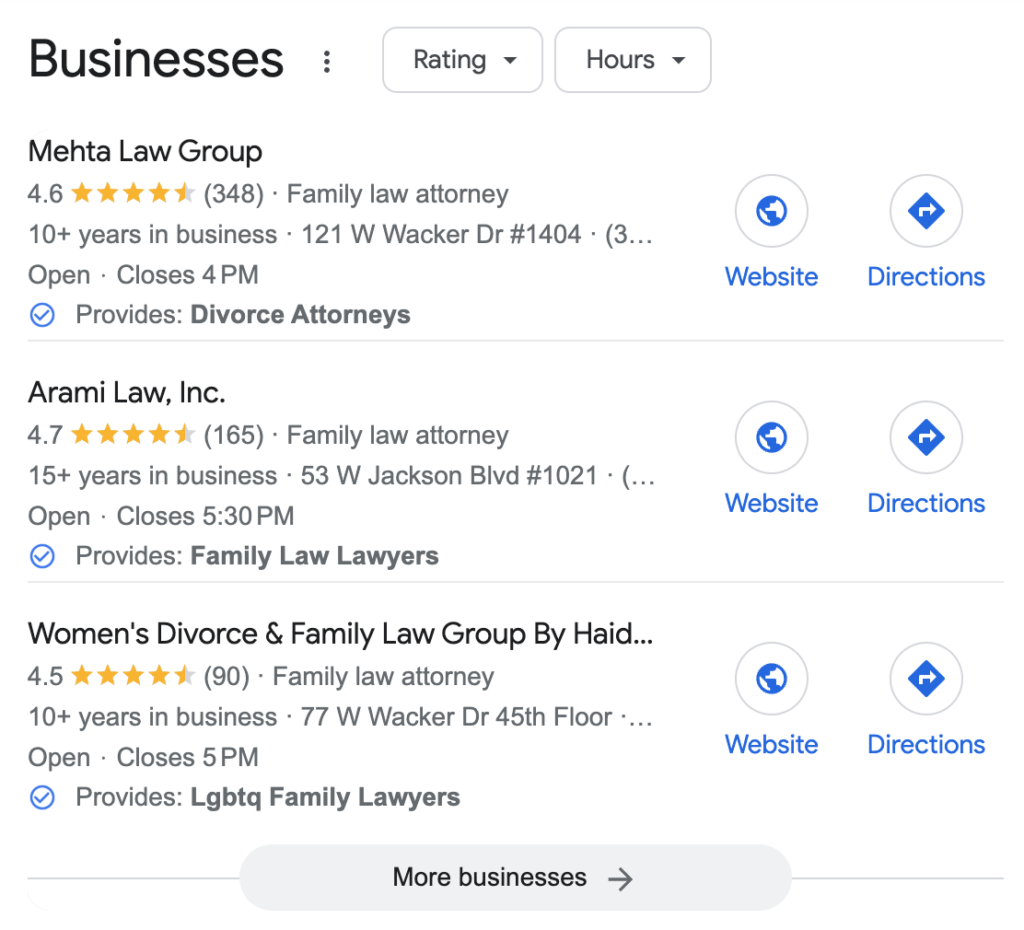
Improving Conversion Rates with Positive Online Reviews
Reviews serve as social proof, reassuring potential clients of the quality of your service. Harvard Business Review reported that a one-star increase in a business’s rating on a platform like Yelp lead to a 5-9% increase in their revenue, underscoring the need for a positive online presence.
Again, in our own survey, 80% of people said they would seek out and take into consideration an attorney’s online reviews before hiring them.
Generating More Online Reviews
Actively seeking out reviews is essential. Encourage satisfied clients to share their experiences online by sending a follow-up email with a direct link to your Google review page. Tools like BirdEye and Podium can streamline this process, making it easier to collect and manage reviews.
Proactively Addressing Negative Feedback
While positive reviews can significantly elevate your firm’s appeal, negative feedback must not be ignored. Addressing negative reviews professionally and promptly can mitigate potential damage and show that your firm values client feedback and is committed to continuous improvement.

Your online reviews and reputation can be as influential as the outcomes you secure for your clients. By actively managing your online reviews, you can ensure that your firm’s digital footprint is a robust and accurate representation of the exceptional legal service you provide.
9. Measuring Success and Analyzing Data in Family Law Digital Marketing
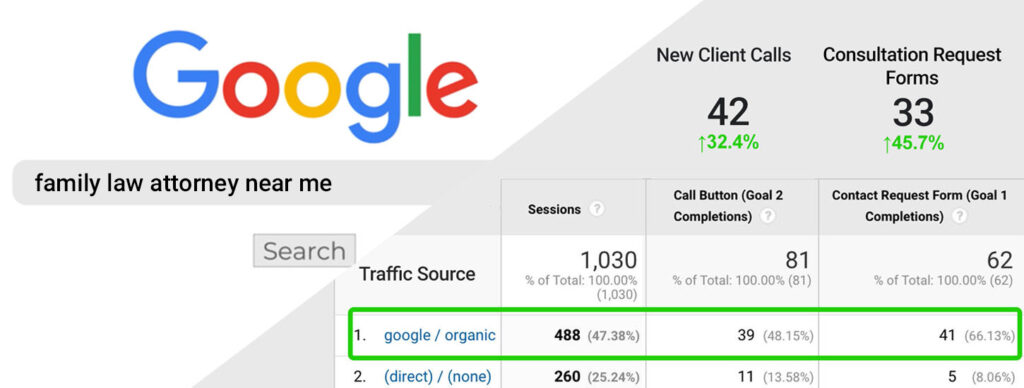
One of the great things about digital marketing is that it is extremely simple to measure and track results. Unlike other traditional forms of legal marketing, you can easily measure your return on investment from your digital marketing efforts.
Not only that, but by tracking your digital marketing campaigns, you can more easily grow your family law legal practice at a pace that you want by investing more into what is working.
For family law firms, the true measure of digital marketing success lies not just in traffic and search engine rankings, but in converting prospects into clients. Here’s how to ensure that your digital marketing campaigns are successful and ROI positive:
Tracking Results of Your Family Law Digital Marketing Campaigns:
- Utilizing Google Analytics: Google Analytics is a cornerstone tool for tracking website performance. It provides insights into user behavior, traffic sources, page views, and time spent on site. For family lawyers, it can reveal which content resonates with clients, how they navigate divorce or custody information, and what drives them to contact your firm.
- Call Tracking: Tools like CallRail and WhatConverts can attribute phone calls to specific digital marketing efforts, enabling you to see which ads, keywords, or campaigns are generating calls. This is particularly valuable for family law attorneys, as it can pinpoint which marketing activities are leading to the most client consultations.
- Conversion Tracking: Beyond calls, it’s essential to track other forms of conversions, such as contact form submissions, newsletter sign-ups, or ebook downloads. This helps in understanding which calls to action are effective and should be optimized for better performance.
- Understanding the Data: Data from digital marketing analytics tools should inform your marketing decisions. For instance, if certain blog posts about child support laws are driving significant traffic, it may be beneficial to increase content in that area or run a targeted ad campaign.
- Setting Up Goals: Within Google Analytics, set up specific goals to track conversions. This could include tracking how many visitors fill out a contact form after reading an article on family law rights or how many use the click-to-call button on mobile.
- Analyzing User Flow: Use Google Analytics to examine the user flow through your website. This will show you where users are dropping off and where they’re engaging the most, providing critical information for improving the user journey and increasing conversions.
- Measuring ROI: With a clear understanding of which marketing efforts lead to client inquiries, you can calculate your return on investment (ROI) more accurately. This allows for smarter allocation of your marketing budget and resources.
- Regular Review and Adaptation: Digital marketing for family law is not set-it-and-forget-it. Regularly reviewing the data from your tracking tools to adapt and refine your strategies is critical to a successful digital marketing campagin. This could mean reallocating budget, tweaking ad copy, or redesigning landing pages for better performance.
Tracking and analyzing your digital marketing results are essential for understanding and enhancing your law firm’s online performance. Tools like Google Analytics and CallRail offer powerful insights into the effectiveness of your digital marketing campaigns. This will enable you to optimize your strategy and ultimately acquire more clients at a better cost-per-acquisition.
Digital Marketing for Family Lawyers Recap
Digital marketing has indisputably become a cornerstone for the success of modern legal practices and family law is no exception. The process of successful digital marketing for family law firms entails a comprehensive approach that goes beyond merely maintaining an online presence. It involves understanding your target audience, effective branding and content strategy, optimizing your website for user experience and search engines, driving website traffic, and always working to improve conversion rates.
Embracing digital marketing strategies such as social media engagement, email marketing, and online reviews can also significantly enhance visibility and new client acquisition. A well-executed digital marketing strategy not only helps attract potential clients but also fosters client retention and builds lasting relationships.
The success of any digital marketing campaign is reliant on careful tracking and analytics. Key metrics such as website traffic, social media engagement, email open rates, conversion rates, and keyword rankings offer invaluable insights into the effectiveness of your marketing efforts.
Always remember that the ultimate goal of your digital marketing strategy should be new client acquisition. Therefore, understanding how to track this key metric is crucial.
Adopting a complete digital marketing strategy is a must for family law practitioners seeking to expand their client base and establish a prominent online presence in today’s digital landscape. With the right approach, digital marketing can be a powerful tool to grow your family law firm, positioning it for long-term success in an increasingly competitive legal market.
About the Author
Chris is a legal marketing consultant who has been helping attorneys and law firms grow their revenue and scale their legal practices for the past 13 years. His areas of expertise are in content marketing, search engine optimization (SEO), pay-per-click (PPC), digital PR & branding, and conversion rate optimization (CRO).
More Family Law Marketing Tips & Ideas

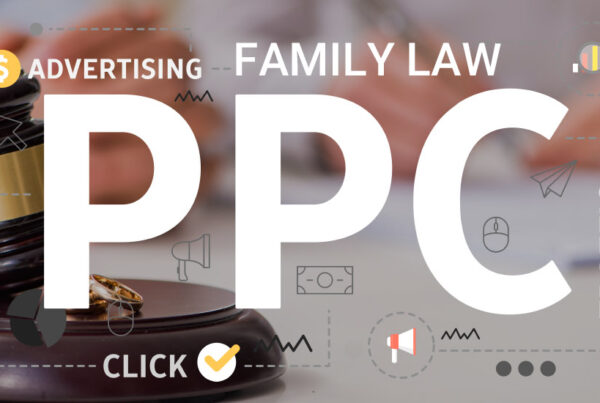
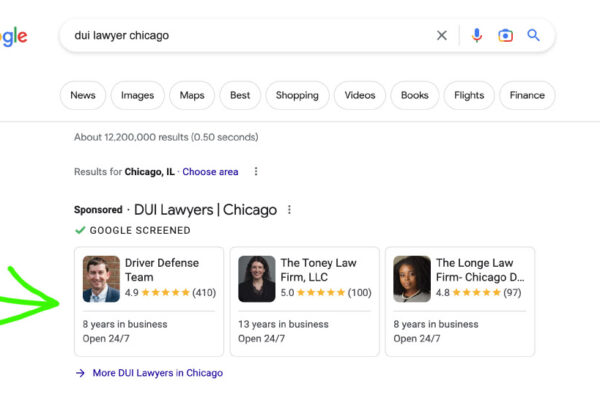
Ready to Start Growing Your Family Law Firm?
Schedule a FREE Strategy Session
What your strategy session will be focused on:
- In-Depth Digital Presence Analysis: Discover how your current online footprint measures up and how to enhance it.
- Competitor Analysis: Uncover what your competitors are doing and how to outperform them.
- Branding & Conversions Analysis: Understand how to not just attract traffic, but convert it into paying clients.
- Expert Second Opinion: Get a fresh perspective on your current marketing strategies and their effectiveness.
- Comprehensive Q&A: Receive personalized answers to your questions, offering clarity and strategic direction for your law firm’s digital marketing efforts.






